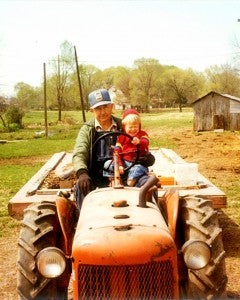The Oil Patch Environmentalist
 My passion for protecting the environment dates back to the 1850s – a farm from the 1850s, that is. I gained an early respect for water and land conservation, learning from my grandfather as he tended to our 4th generation family farm just outside of Neosho in Southwestern Missouri. Our farm is spring fed, so you have to be able to manage your water usage very well. I had the opportunity to participate in all aspects of running a farm, from irrigation to plowing the fields. On top of managing the farm, my grandfather was head of Neosho’s water department and we spent a lot of time hiking and fishing in nature. Water, land and the outdoors were at the center of everything he loved, and through his example it became clear to me at a very young age that managing your impact on the environment was of the utmost importance.
My passion for protecting the environment dates back to the 1850s – a farm from the 1850s, that is. I gained an early respect for water and land conservation, learning from my grandfather as he tended to our 4th generation family farm just outside of Neosho in Southwestern Missouri. Our farm is spring fed, so you have to be able to manage your water usage very well. I had the opportunity to participate in all aspects of running a farm, from irrigation to plowing the fields. On top of managing the farm, my grandfather was head of Neosho’s water department and we spent a lot of time hiking and fishing in nature. Water, land and the outdoors were at the center of everything he loved, and through his example it became clear to me at a very young age that managing your impact on the environment was of the utmost importance.
I grew up in Tulsa, just a few hours southwest of the family farm. Once known as the oil capital of the world, Tulsa has a long and proud history of oil production. By some estimates, a quarter of all jobs in Oklahoma are tied to the energy sector. As early as high school, I was involved in environmental advocacy, even in the oil patch. That may sound contradictory – environmental advocacy in the oil capital – but I figured out along the way that the industry and environmental stewardship weren’t mutually exclusive. My family taught me a practical and pragmatic approach to protecting the environment, and reiterated that the lessons of conservation learned on my family’s farm could have relevance to the oil and gas industry that surrounded me.
Being from Oklahoma, there weren’t many career options outside of working in the oil and natural gas industry. I spent nearly ten years working in the industry, starting in the environmental department of a small company and working my way up to the executive team.
Today, I oversee EDF’s efforts to reduce the environmental impacts of oil and gas activities in the Marcellus region, which probably contains a few of its own family farms. The insider perspective that comes from almost a decade of working in the oil and gas industry helps me better understand how environmental decisions are made within a business, and how technology and regulation can help to proactively reduce environmental impacts. Most critically, I know how to recognize opportunities to align environmental protection with profitability.
Even though I am now based in Washington, D.C., I still come from the oil patch. And I still value a practical, pragmatic approach to solving complex environmental issues – something EDF and I definitely have in common. EDF approaches issues like regulatory control and legislation in this same manner, and I’m proud to play a part in the organization’s work to reduce the environmental impacts of natural gas, and continue the legacy that started so many years ago on my family’s farm. Our natural gas work at EDF centers around protecting our air, water and landscapes from poor development practices that can have a very direct effect on land owners. The lessons of conservation learned from my grandfather remind that when it comes to natural gas development, we must get the rules right. Generations and family farms to come depend on it.
This is one of a group of posts about why industry experts work at EDF.











One Comment
Congratulations, EDF. Andrew’s experience and temperament is exactly the winning combination this country needs to solve the very complex challenges with today’s extraction industry.